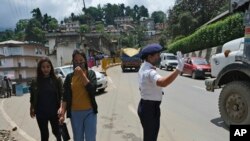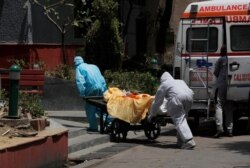Officials in India say some shopping malls, hotels, restaurants and religious places will be allowed to reopen after the COVID-19 lockdown, although the worst-hit regions could remain in lockdown for another month.
With cases of coronavirus reaching new highs in recent days, Prime Minister Narendra Modi said the “battle will stretch on” and appealed to people to follow all lockdown rules to stop the spread of the virus.
“Our country is besieged with problems amidst a vast population and limited resources,” Modi said in an open letter to the nation Saturday marking one year of his government’s second term.
Bit of optimism
At the same time he sounded an optimistic note, asserting that India was on the path to “victory” in its battle against the coronavirus and would set an example in “economic revival” following a two-month shutdown of most of the nation’s businesses.
The decision to open more of India's economy came as the country recorded its highest jump in COVID-19 cases Friday, adding nearly 8,000 new infections. The world’s second most populous country now has 174,000 cases and is among the 10 most affected countries in the world. Nearly 5,000 people have died, and health experts have warned that the pandemic’s peak has not yet been reached.
Government officials say that a lockdown imposed on March 25, when India had only 500 cases, has helped prevent many infections and has given the country time to prepare to cope with the pandemic. But with the economy stalled for nearly two months, most experts say India needs to return to business as usual and learn to “live” with the virus.
Although authorities allowed some shops to reopen this month and resumed limited train service and domestic flights, much of the country still remains shuttered.
Openings
That could change starting June 8, when some shopping malls, restaurants and other hospitality services will be allowed to open. Educational institutions, however, will remain shut for another month.
So far, more than 70% of coronavirus cases in India are concentrated in Maharashtra, Gujarat, Tamil Nadu, Madhya Pradesh and Rajasthan states, plus Delhi. But as hundreds of thousands of migrant workers, who were stuck in cities without jobs and money when India announced its lockdown, return to their villages, there are fears that the infection could spread into the countryside.
The pandemic has led to millions of job losses, particularly in the unorganized sector, which accounts for 80 percent of the workforce.
In his letter to the nation, the prime minister acknowledged that "laborers, migrant workers, artisans and craftsmen in small-scale industries, hawkers, cart pushers and such fellow countrymen have suffered immensely. However, we have to take care to ensure that inconveniences that we are facing do not turn into disasters.”








